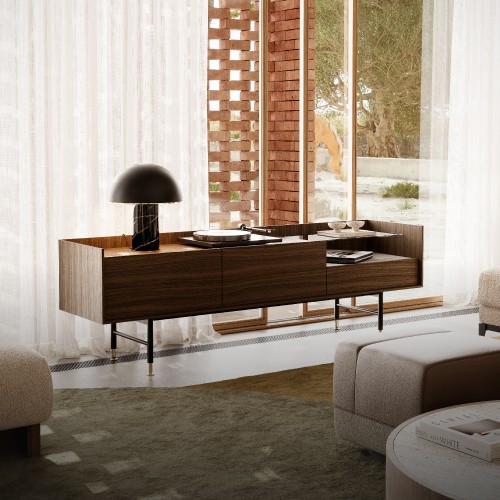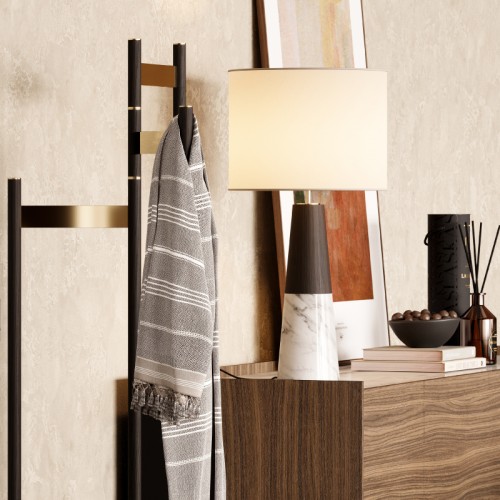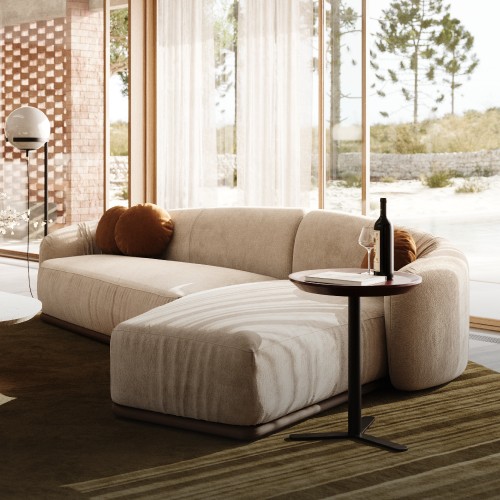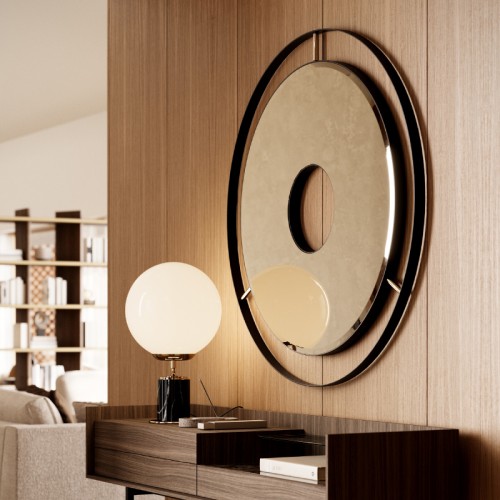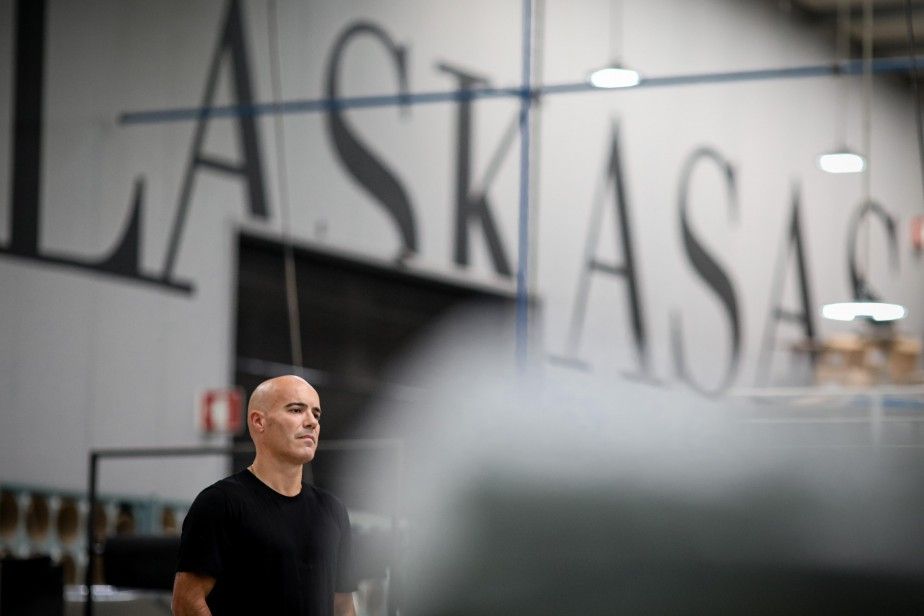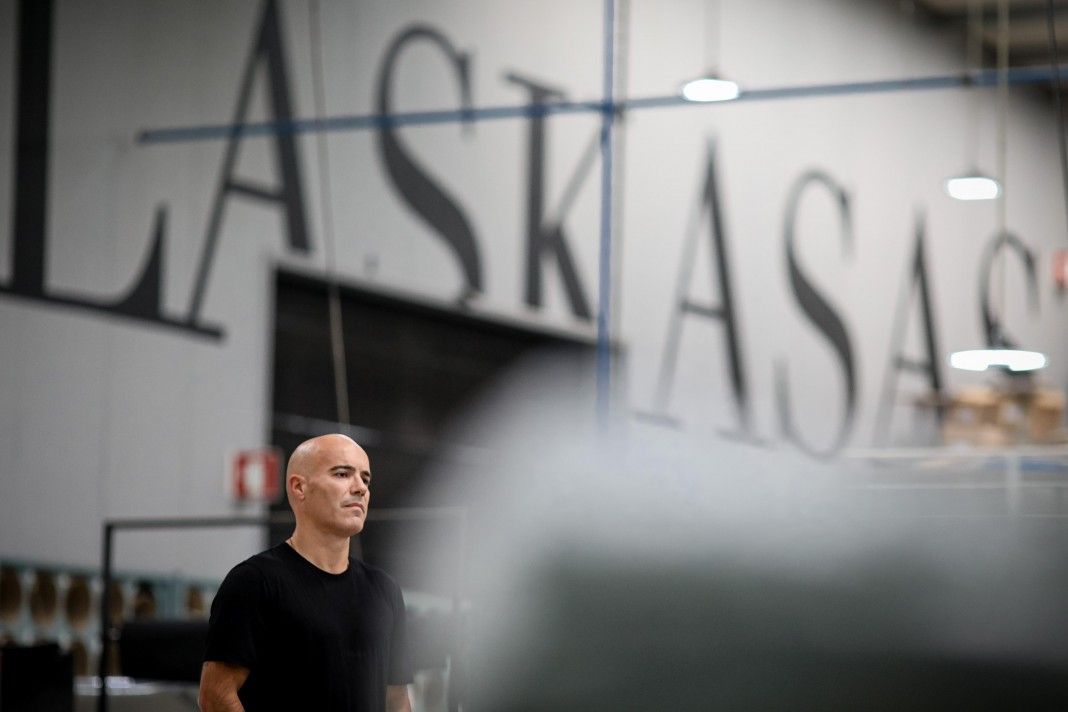As we commemorate the remarkable milestone of Celso Lascasas' 50th anniversary, on January 26th, we delve into the journey of success behind Portugal’s premier furniture brand.
From its humble beginnings in a 300-square-meter warehouse to its current stature with three industrial poles spanning 35,000 square meters, 500 employees and a global turnover of 36 million euros, 36% of which due to the export activity, Laskasas has evolved into a symbol of excellence in interior design made in Portugal.
In this exclusive interview, we explore the motivations behind Celso's initial steps and the driving force propelling subsequent milestones.
Reflecting on the inception of Laskasas nearly two decades ago, Celso shares his unwavering ambition to create something of his own, fueled by a deep-rooted desire for independence. His journey, marked by ambition and a willingness to take risks, led to the organic growth of the company, transforming it into a beacon of success in the furniture industry.
From the outset, Celso envisioned building a brand that transcended borders, a goal that has launched Laskasas into international markets. Through meticulous attention to product differentiation and a keen focus on branding, the company has positioned itself as a leader in Portugal and a strong player aiming efforts to other markets like the UK, the Middle East, and the United States.
Looking ahead, Celso shares his vision for the future, which includes further expansion into international markets and diversification of the brand. With a renewed focus on exportation and the exploration of new avenues, Celso's entrepreneurial spirit continues to drive Laskasas towards even greater heights of success.
Join us as we celebrate five decades of resilience, and the enduring legacy of Celso Lascasas and Laskasas in the world of furniture design.
On November 1st, 2004, Laskasas was born in a 300-square-meter warehouse - a very different reality from today, with three industrial centres and 35,000 square meters of covered area. What was the motivation behind this first step and what was the fuel for the next ones?
My mindset was always to have something of my own, at least try to. I never accepted that I had to work with others, knowing I could have the life I have today. So, the fuel was ambition.
When I opened the company 19 years ago, if you asked me: Were you thinking of achieving everything you have achieved with the ambition you had? The answer was no. Even with the ambition to want more, to do more, no.
But then, things happen and suddenly you have 500 people working in your organisation and 35,000 square meters of covered area, which I'm very proud of, because as you know, we produce everything here.
Then, there's the other word that I often repeat, which is risk. Now, I think a bit more, I have more data to read, to decide some things, but back then there was no data, there was nothing, so it was my feeling, and the risk was always imminent. Always, always, always.
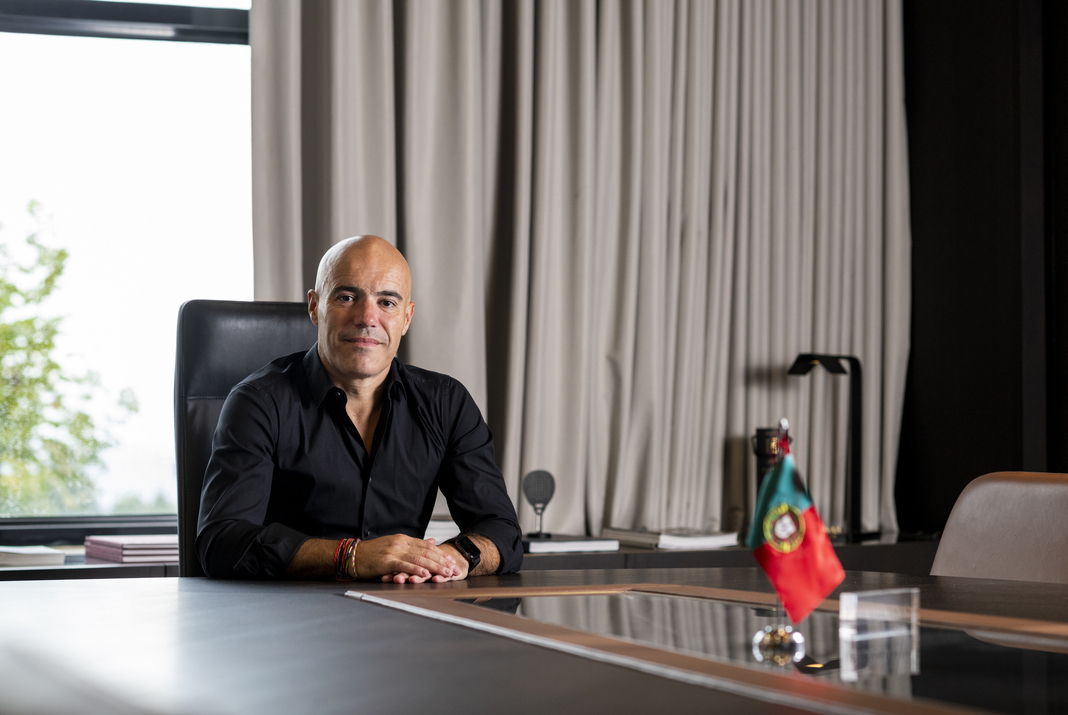 Source: Laskasas | Celso Lascasas at Laskasas' conference room
Source: Laskasas | Celso Lascasas at Laskasas' conference room
What motivates you to the next level?
As you know and people know, my studies were, now it's not so much, but they were very minimal. I was brought up on the factory floor as a carpenter learning the art of carpentry.
From day one, I always wanted to create a brand, it was always my idea. I can tell you that my first salaries, which I earned in the first few months, in the first few years, I invested all in communication, even a bit ad hoc, because I didn't had much knowledge.
We're talking about a time when we only worked for the domestic market, the Portuguese market. However, I've always had that mindset. I wanted to create value for what I was selling. I wanted people to get to know the brand, the company.
And now, much more, because now we have a team. We have people who understand things much more than I do.
Then there's also the emotional side, which is the name Lascasas. A name that wasn't very respected in our city. This was because of my father, he made some business blunders and I was ashamed of the name Lascasas at school, when I was 12 or 13. And this was also a reason why I wanted to put the Lascasas name on the company, even though it was a bit of a risk because the name wasn't very well connected, but I always had this focus on wanting to turn this around and put the family name back on, to be proud of the name I have. And fortunately, I succeeded.
Now, I want to pass this legacy on to my two sons. Already much better than they passed it on to me. Now I can tell them: You have a group here, a worldwide company, on a global scale, with a magnificent and clean name.
What challenges did this 30-year-old man found when he decided to start a company 20 years ago? Is today's reality different when it comes to entrepreneurship?
I opened Laskasas when I was 28 or 29 years old more or less. I think I'd already been in a position to set up this dream that I had four or five years before, but at the time I was working for a furniture company and I was an employee, I was a collector there. I already had some responsibilities and my family never wanted me to leave, because they were afraid it wouldn't work out, that it was a big risk for me to set up a company.
I was already earning relatively well, and I kept some money with me. However, I lost four or five years. I think we could be celebrating almost 25 years now, but that's the way it is. I listened a lot to my grandmother and grandfather, but there came a certain point when I decided, whoever came along, it's decided – "I'm going to leave the company and set up my own", I said.
And so I did. I didn't had much money to set up either, but there were some players here who trusted me and helped me.
At the time it wasn't the organisation we have now. I started with buying and selling, with trading, a simple shop, so I didn't create any value. I bought products that other shops also bought from some factories in the area.
I didn't set up an industry because I didn't have the liquidity for it, but it was always in the back of my mind that as soon as I could and if things worked out, that was my idea.
After 4 or 5 years, as soon as I could, I set up a small workshop, almost a handicraft workshop, and started making some products.
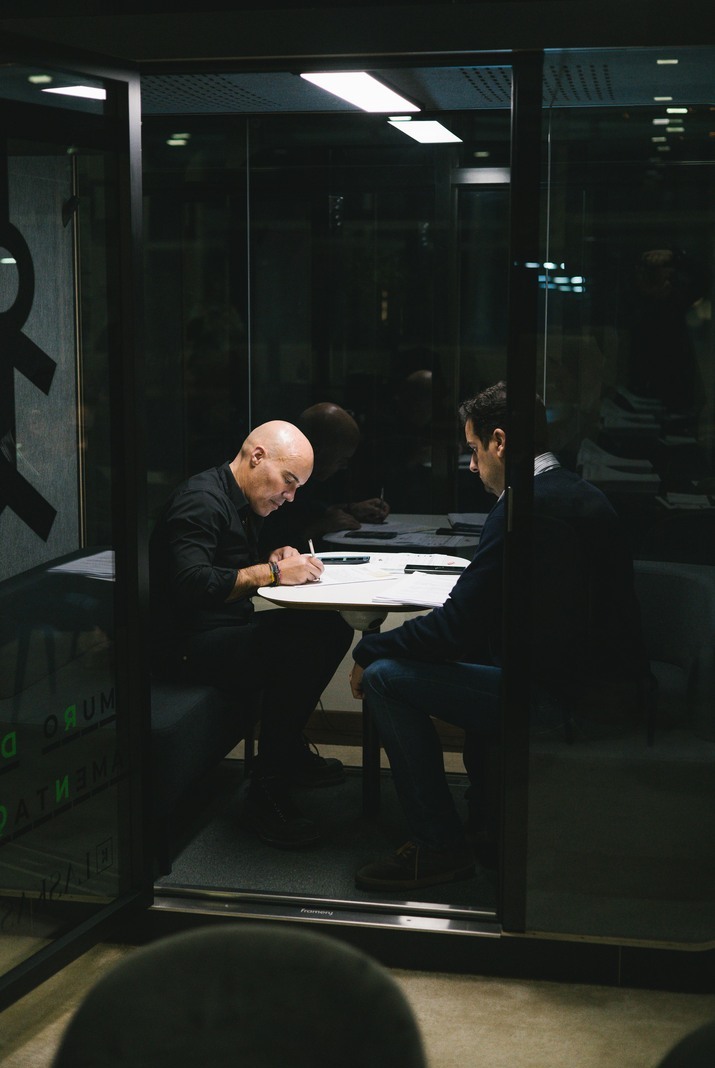 Source: Laskasas | Celso Lascasas
Source: Laskasas | Celso Lascasas
Who designed these products, Celso?
It wasn't anyone, it was the designer here who went to some trade shows in Italy, Spain and France, saw what was new, made some changes, a bit by how I felt it should be. I also spent a lot of time in Laskasas' shops, working on Saturdays and Sundays, mainly to see what the customers needed. All this combined with my training as a carpenter.
The fact that I presented differentiated products on the market was the click that got me to the right place. Because, if I carried on with that mindset, which is what most companies do... sell a chair that is sold in 20 or 30 places, the same chair... how is that differentiating? It's just the price...
On the subject of entrepreneurship, I have great confidence in Celso. That's why everything that depends on me has to be done. That's why the word risk is always on the game. Because I take risks, I trust myself, I trust what I can pass on to my staff, to my teams.
If I take a risk, I create another commitment. I have to fulfil that commitment. And if I have to fulfil it, things have to happen and it's not in a month's time, it's yesterday. It has to happen, let's fight.
Laskasas has established itself in Portugal as one of the best and most recognised furniture brands, if not the best. We also know that the brand is expanding more and more internationally. Has the Portuguese market started to become small?
What we've done in our country is beautiful, however I don't think there's much more to do, much more to invent, because we have 11 million inhabitants and our purchasing power, unfortunately, isn't very high.
After the crisis of 2011, 2012, which also knocked on our door, were two very bad years. I can tell you that I used to think, at night, when I left the company, that I might not be able to carry on with my project, that it was going to end. It was a very sharp downturn at the time of Troika. But I managed to reduce costs as much as possible, and I fought. That ambition.
However, I had a lot of thoughts about what people said to me before I started the company... "You won't be able to do it", "you're crazy", "leave yourself where you are", and those thoughts, on those difficult times, I thought that maybe those people were right... but I managed.
And that was a learning experience for me too. I thought that I never wanted to go through that again in my life and I had to change things. Then I started to think globally. I couldn’t have everything concentrated in such a small country and I had to start opening doors abroad. That's when we started hiring some people to help us and doing some smaller fairs in Spain and France.
This was the time when a new challenge began, to think on a global scale and to do what we were doing on the inside as well as on the outside.
.jpg) Source: Laskasas | Laskasas' factory from a bird's-eye view
Source: Laskasas | Laskasas' factory from a bird's-eye view
What is the brand's main export markets and what attracts them to Laskasas?
The best markets and the ones where we're investing the most are the UK and Middle East. These are already consolidated markets, people already know the brand well, and we have a showroom in London to support professionals.
There's also another focus of mine. I love the United States, I love their thinking and I go there often. It's a market we're trying to enter and it's going to be one of our focuses over the next two or three years.
Then, another important point is that these markets are able to accommodate the prices of our products.
We've also come to realise that in countries like Spain, for example, our product isn't as well accepted. Unlike in Dubai or London, where our product is a success. We also understood that these were places where we could invest more in terms of showrooms, fairs, and communication because we could make a difference there.
Allied to this, our position is alongside the big Italian brands, but at a slightly lower price.
In short, it's the price, the service, and the excellent team we have here. Excellent in terms of creation. We have 8 people here who create our collections every year, our products, and this has always set us apart.
There are two very important aspects here: product creation and product communication. And I'm a carpenter, I don't know anything about it, but I realise that these are two very important departments for the company and the company's growth has been very much concentrated there.
That's when I said: I want people here to create product, to create value, and then I want excellent people to communicate that product. And when that's the case, success is already on the way. Because then, on the commercial side, things are easier. If the product is good, reasonably priced and we communicate what we're doing very well, we're giving the commercial side a very important boost.
As its founder, what is your vision for Laskasas regarding the export market? To become one of the most recognised brands in Europe and in the world, while at the same time promoting what is made in Portugal, its industry and design as a Portuguese flag?
From the first day we started this adventure of attending international trade fairs, about four years ago, I have been committed to keeping the "Made in Portugal" stamp on our products. Indeed, I can already feel a difference in the perception and relevance of our country in the minds of our customers and partners. And I'm sure that Laskasas and the other brands in the group have played their part in this process.
The reason for this is that we exhibit extremely well at trade fairs, with magnificent stands that make people wonder about the Italian supremacy in the industry. At the same time, we, as a Portuguese company, with top quality and service, are already being noticed and are starting to make a difference to international experts in the field.
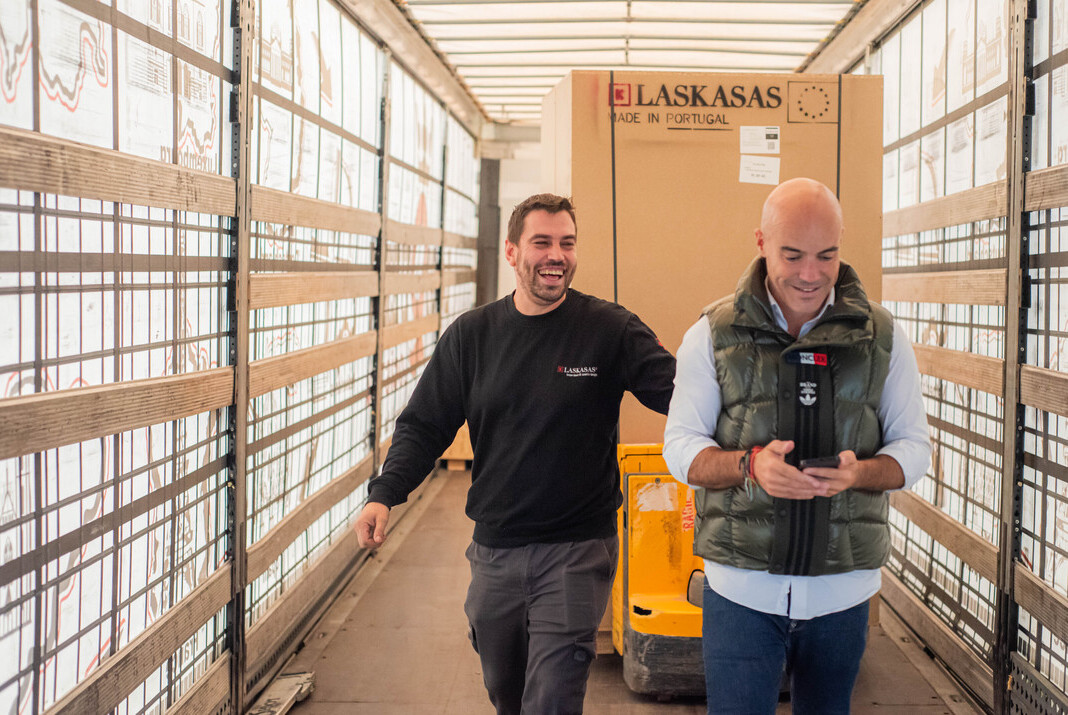 Source: Laskasas | Celso with a brand's employee
Source: Laskasas | Celso with a brand's employee
Would you say that the Laskasas Group brands are, in a certain way, pioneers in the Portuguese furniture industry in terms of exporting this portuguese know-how?
No doubt about it. Along with two or three other brands, we are the international anchors of our sector.
For example, we're going to iSaloni in April, and we'll be there at the highest level. The only difference between us and the leading Italian brands at this fair will be in terms of area, because the exhibition doesn't allow us to have more space.
Since I started Laskasas, 19 years ago, I have been going to iSaloni because I loved to visit and be inspired by it, but I never thought that Laskasas would be there one day. So, when we went for the first time, four years ago, it was an unbelievable feeling, only I know what I felt: to see my brand at such an event. So, now I go to the other stands, the magnificent ones with the queues to get in, and I set new goals depending on what I see, and I know we'll get there. And then when we'll get there, I'll have another goal because I keep looking up, wanting more, dreaming.
Based on what you've said, what are the export targets that have already been reached and which ones are remaining?
One of the things we had already set out to do was to get above 30% of turnover on the export activity, and we've done that. At the end of 2023 we were at 36%, but the focus over the next two, three years at the most, is to break through the 50% barrier.
.jpg) Source: Laskasas | Laskasas' team at Salone del Mobile
Source: Laskasas | Laskasas' team at Salone del Mobile
Closing this export chapter and looking at values such as focus, discipline and consistency, all so closely related to Celso's professional and personal life, my question is: are these the elements of success that guarantee both the growth and the expansion of the Laskasas' brand? Or is there something more?
I suppose the only word missing is rigour. Also, ambition, because the more we sell, the more room we have to pay better salaries and to grow. That's why rigour and timing are so important to me; there is no point in having goals without setting out when we will achieve them, and for that commitment is essential.
In fact, I need to point out that when people talk about entrepreneurship, sometimes they forget that entrepreneurship doesn't have to be about starting a business, and that's what I try to pass on, both to my staff and to other people: "Be willing to take chances, wherever you are, whatever your position, and if you don't get rewarded for it, then you're in the wrong place".
For you, how important is it to make it happen?
Super important. As I often say "theories don't pay any bills". Today, and much more than 20 years ago, we are numbers, so we must deliver results.
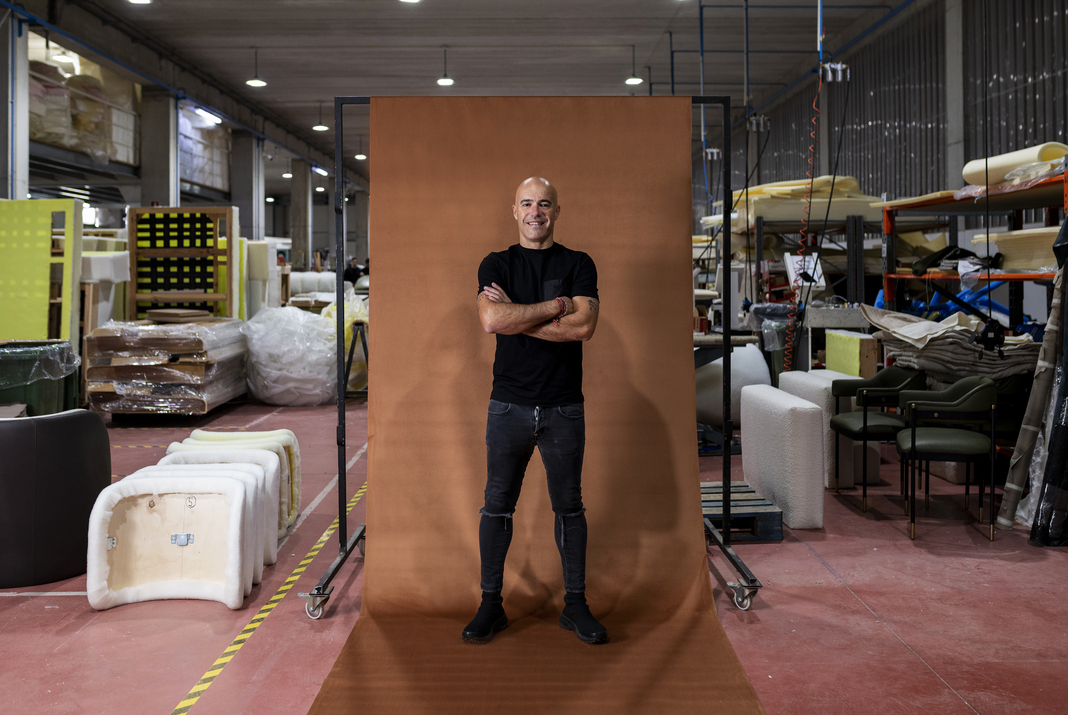
Source: Laskasas | Celso Lascasas
And does the feeling of permanent urgency exist?
It exists, and I admit it's such a bad thing because sometimes I want things to happen on the fly. And, usually, this means that things don't work out so well.
However, that's the dynamic, that's me, and things happen based on experimenting because I'm a person who wants to succeed and accomplish what I set out to do.
Besides being a successful company, Laskasas is often associated with family values. How does the family dynamic affect the company's development and growth?
It has affected me enormously.
I have a wonderful partner who supports me unconditionally, and that makes all the difference. As a matter of fact, my wife Diana is now part of the board as CEO of the brand and is my right hand in every way. And since I met her, things have started to work out far better, personally and professionally, because she has brought me peace of mind and work balance.
And then there was my son Martim, who also taught me to stop and let go of some professional things because with Sofia, 15 years ago, I couldn't, and I regret that.
I mean, now I know that my children and wife are the priorities so I live my life around them.
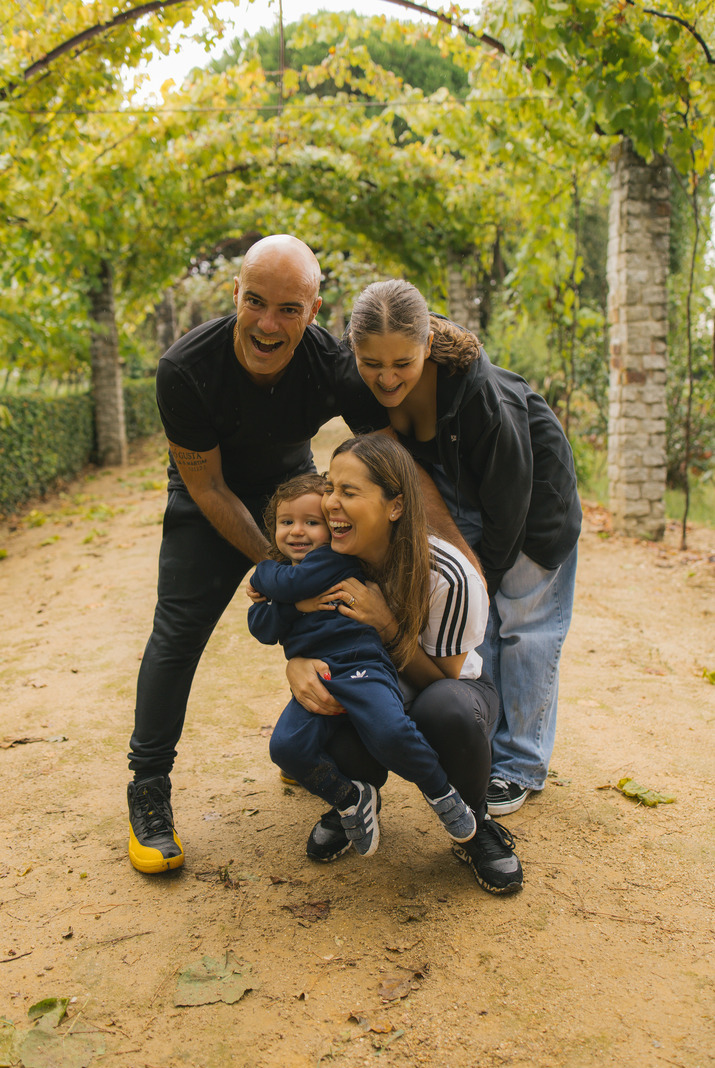
Source: Laskasas | Celso with his family(From left to right, top to bottom — Celso, Sofia, Martim and Diana)
What are Laskasas and Celso's upcoming plans? Is there any news you can reveal?
As you know, there have been some changes, such as naming Diana as CEO of the company, and although I remain deeply engaged in everything, I feel that Diana is starting to carve out her own space with the team she is building.
On a personal level, I started a company in 2022, a property developer which is part of the Laskasas group. But this will be a breakthrough year for it, having already made some investments in Porto and Paredes. So now I want to focus and invest in this area.
Could we sum up by saying that Laskasas' and the group's future lies in export and diversity?
Yes, exactly. These are our two pillars.
(1).jpg)
Source: Laskasas | Celso Lascasas
If you had to choose one product from Laskasas, what would it be and why?
Something I've always loved about Laskasas, perhaps a little less now given the brand's evolution, was the K010 chaise sofa. It was one of the brand's bestsellers for 9 years, something we are planning to recreate for the brand's 20th anniversary. It was one of the first products that spoke to me.
(1)(1)(2).jpg)
Source: Laskasas | K010 chaise sofa
